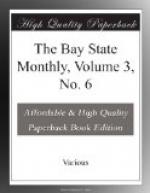The New York Independent, after referring to the various books on Arctic explorations and adventure—the narratives of Kane and Hayes and Gilder and De Long—says of Dr. Nourse’s work: “The field of Arctic authorship was not yet, however, covered by any of these works, and it is to the credit of Professor Nourse that he saw what remained to be done. In the work before us he comes into no competition with the literary workers who have preceded him. No one will be the less disposed to read Dr. Kane’s chapters, or to peruse Mr. Gilder’s, for having read Professor Nourse; nor, on the other hand, will these works prejudice Professor Nourse’s chance to be read. His book stands on ground of its own, as the one complete and competent survey of what American explorers have done in the polar zones.... Professor Nourse’s volume is embellished with numerous good illustrations, and provided with an excellent and indispensable circumpolar map. It deserves the successful sale we understand it is already receiving.”
The Literary World in a review of the book says “it is an encyclopaedic review of the whole subject of American enterprise in Arctic seas,” and adds: “Professor Nourse’s book bears the credentials of accuracy and authority, is well printed and bound, has numerous engravings and useful maps, including some portraits on steel, has a suitable index and table of contents, and furthermore is provided with a bibliography of chief publications on Arctic research since 1818. In every respect, then, it is a well-made book, a solid contribution to popular reading.”
* * * * *
BACCALAUREATE SERMONS.
D. Lothrop & Co., of Boston, have published in book form nineteen baccalaureate sermons preached at Harvard College, by Dr. A.P. Peabody, the new Professor of Christian Morals. Dr. Peabody’s reputation, as a vigorous thinker and manly preacher, is as wide as this Republic; and the volume of sermons before us is something more than a series of homilies. It is a collection of addresses to young men—students just ready to embark on the perilous sea of life—which may be profitably read by every citizen of our country. The preacher does not address himself to any single side of human life. He counsels the students in their duties as men in all the relations of life. And in the selection of themes he embraces a great variety of topics. In the discourse on “Hebrew, Latin and Greek,” for example, he takes the first-named tongue as standing for religion, the second for beauty and the third for strength. On this triad be formulates not only an intellectual cult but a practical rule of life. Another notable sermon is on “The Sovereignty of Law,” an admirable disquisition on the supremacy of law in the intellectual life, the physical existence, the domain of morals and in every department of human activity. Dr. Peabody’s style is forcible and virile, and his compactness of statement, enables him to put “infinite riches in a little room.”—Chicago Tribune.




